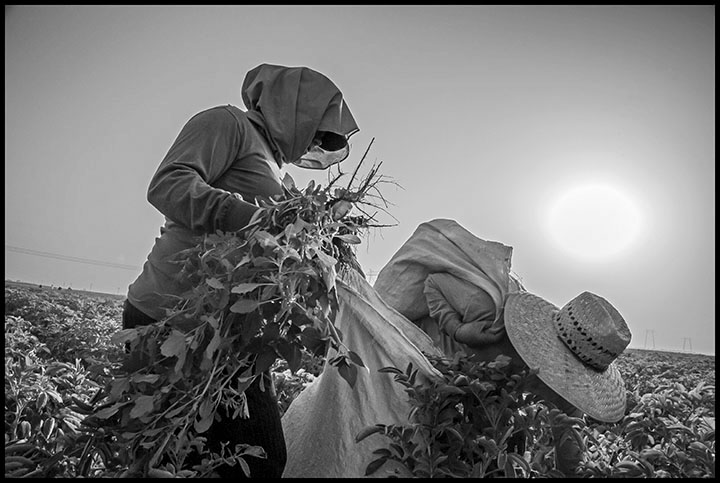by David Bacon
VERNON, WA – Tulips and daffodils symbolize the arrival of spring, but the fields are bitterly cold when workers’ labors begin. Snow still covers the ground when workers go into the tulip rows to plant bulbs in northwest Washington state, near the Canadian border.
Once harvesting starts, so do other problems. When a worker cuts a daffodil, for instance, she or he has to avoid the liquid that oozes from the stem-a source of painful skin rashes.
Yes, the fields of flowers are so beautiful they can take your breath away, but the conditions under which they’re cultivated and harvested can be just as bad as they are for any other crop. “Tulips have always been a hard job, but it’s a job during a time of the year when work is hard to find,” says farmworker Tomás Ramón. “This year we just stopped enduring the problems. We decided things had to change.”
On Monday, March 21, their dissatisfaction reached a head. Three crews of pickers at Washington Bulb accused the company of shorting the bonuses paid on top of their hourly wage, Washington’s minimum of $14.69. Workers get that extra pay if they exceed a target quota set by the company for picking flowers.
The parent company of RoozenGaarde Flowers and Bulbs is Washington Bulb, the nation’s largest tulip grower.
“We’ve had these problems for a long time,” explains Ramon, who has cut tulips for Washington Bulb for seven years. “And the company has always invented reasons not to talk with us.”
Workers stopped work that Monday and waited from eight in the morning to see how the owners would respond. The general supervisor was sick, they were told. Someone from the company would talk with them, but only as individuals. “We didn’t want that,” Ramon says. “We’re members of the union, and the union represents us.”
Union Wherever They Go
Over two-thirds of the 150 pickers for Washington Bulb work at the state’s largest berry grower, Sakuma Farms, later in the season-where they bargain as members of Familias Unidas por la Justicia (FUJ), an independent union. Starting in 2013, farmworkers there struck and boycotted, and finally won a contract after four years. They formed Familias Unidas. At Washington Bulb there is no union contract, yet. But to Ramon and his workmates, they are members of FUJ wherever they go.
When the company wouldn’t talk on that Monday, 70 workers voted to strike the following day. Another 20 joined them the next morning, when they again demanded to talk with the company. This time one of the owners told them he wouldn’t talk if the president of Familias Unidas, Ramon Torres, was present.
“So we said, ‘If you won’t talk with our representative, we won’t talk without him,'” Tomas Ramon remembers. “‘We have a union and you have to make an agreement with him.’ So the owner got angry and left.”
That Wednesday the flowers were just waving in the breeze, waiting for someone to pick them. The day after, the company lawyer was on the phone to union attorney Kathy Barnard. With a commitment to begin negotiations, workers agreed to go back into the rows after the weekend, and talks got started.
“By the first day of the strike the workers had already met, elected a committee, and put their demands in writing,” said FUJ’s political director Edgar Franks. “After the four years of fighting for the contract at Sakuma Farms, they knew how to organize themselves quickly. They had community supporters on their picket lines after the first day. They had their list of demands, and finally forced the company to accept it.”
Rubber Band Time
When the workers committee and Torres met with Washington Bulb president Leo Roosens on Friday, they went point by point over their 16 demands. Roosens made an oral commitment to resolve all except the demand over wage increases.



